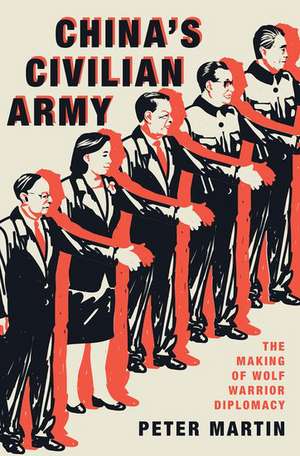China's Civilian Army: The Making of Wolf Warrior Diplomacy
Autor Peter Martinen Limba Engleză Paperback – 20 apr 2023
| Toate formatele și edițiile | Preț | Express |
|---|---|---|
| Paperback (1) | 110.62 lei 10-16 zile | +31.70 lei 4-10 zile |
| Oxford University Press – 20 apr 2023 | 110.62 lei 10-16 zile | +31.70 lei 4-10 zile |
| Hardback (1) | 136.69 lei 10-16 zile | +62.86 lei 4-10 zile |
| Oxford University Press – 14 oct 2021 | 136.69 lei 10-16 zile | +62.86 lei 4-10 zile |
Preț: 110.62 lei
Preț vechi: 125.20 lei
-12% Nou
Puncte Express: 166
Preț estimativ în valută:
21.17€ • 23.01$ • 17.80£
21.17€ • 23.01$ • 17.80£
Carte disponibilă
Livrare economică 20-26 martie
Livrare express 14-20 martie pentru 41.69 lei
Preluare comenzi: 021 569.72.76
Specificații
ISBN-13: 9780197647028
ISBN-10: 0197647022
Pagini: 320
Dimensiuni: 228 x 148 x 21 mm
Greutate: 0.45 kg
Editura: Oxford University Press
Colecția OUP USA
Locul publicării:New York, United States
ISBN-10: 0197647022
Pagini: 320
Dimensiuni: 228 x 148 x 21 mm
Greutate: 0.45 kg
Editura: Oxford University Press
Colecția OUP USA
Locul publicării:New York, United States
Recenzii
The author makes extensive use of Chinese language documents; particularly interesting are the memoirs of retired Chinese diplomats used by him. They provide an insight into the inside of Chinese diplomacy.
China's Civilian Army is based on Martin's experiences as a reporter in China, as well as dozens of interviews with current and former diplomats in Beijing, Washington and London. Furthermore, it draws on the memoirs of more than 100 retired Chinese diplomats. This is indeed a remarkable achievement.
Fascinating and engrossing, China's Civilian Army sheds new light on the inner workings of Chinese foreign policy. Absolutely required reading for anyone who needs to deal with China or seeks to understand its rise.
There's never been a more important time to understand the motivations that drive Chinese diplomacy. Peter Martin's superb book delves into the history of China's diplomatic corps in way that sheds new light on the nature of Chinese power today. It should become required reading for anyone who hopes to understand Chinese foreign policy.
Peter Martin has decoded Chinese diplomacy in this fascinating and carefully researched study. He describes how China's foreign service evolved with the country from humble revolutionary beginnings—and became a voice for a new, rising China whose self-confidence sometimes borders on arrogance. Martin's book explains how China learned to talk like a global superpower.
Martin's book is an absolute marvel—a penetrating portrait of China's political psychology, based on rich, insider accounts that hardly any foreigners have accessed. Entertaining, learned, and immediately useful, this is nothing short of a how-to manual for understanding China's strategy in the world.
The United States simply cannot outcompete China without outcompeting its diplomats and economic influence in Asia and around the world. Martin's book skillfully captures the steely determination of China to secure its interests abroad, demonstrating the challenges facing the US and its partners and underscoring the criticality of working together to develop more coordinated approaches to China across the board.
Peter Martin paints a deeply human portrait of China's emissaries, pulling back the veil on their motivations and struggles.
China's Civilian Army is based on Martin's experiences as a reporter in China, as well as dozens of interviews with current and former diplomats in Beijing, Washington and London. Furthermore, it draws on the memoirs of more than 100 retired Chinese diplomats. This is indeed a remarkable achievement.
Fascinating and engrossing, China's Civilian Army sheds new light on the inner workings of Chinese foreign policy. Absolutely required reading for anyone who needs to deal with China or seeks to understand its rise.
There's never been a more important time to understand the motivations that drive Chinese diplomacy. Peter Martin's superb book delves into the history of China's diplomatic corps in way that sheds new light on the nature of Chinese power today. It should become required reading for anyone who hopes to understand Chinese foreign policy.
Peter Martin has decoded Chinese diplomacy in this fascinating and carefully researched study. He describes how China's foreign service evolved with the country from humble revolutionary beginnings—and became a voice for a new, rising China whose self-confidence sometimes borders on arrogance. Martin's book explains how China learned to talk like a global superpower.
Martin's book is an absolute marvel—a penetrating portrait of China's political psychology, based on rich, insider accounts that hardly any foreigners have accessed. Entertaining, learned, and immediately useful, this is nothing short of a how-to manual for understanding China's strategy in the world.
The United States simply cannot outcompete China without outcompeting its diplomats and economic influence in Asia and around the world. Martin's book skillfully captures the steely determination of China to secure its interests abroad, demonstrating the challenges facing the US and its partners and underscoring the criticality of working together to develop more coordinated approaches to China across the board.
Peter Martin paints a deeply human portrait of China's emissaries, pulling back the veil on their motivations and struggles.
Notă biografică
Peter Martin is a political reporter for Bloomberg News. He has written extensively on escalating tensions in the US-China relationship and reported from China's border with North Korea and its far-western region of Xinjiang. He previously worked for the consultancy APCO Worldwide in Beijing, New Delhi, and Washington, where he analyzed politics for multinational companies. In Washington, he served as chief of staff to the company's global CEO. His writing has been published by outlets including Foreign Affairs, the National Interest, the Guardian, the Jamestown China Brief, the Diplomat and the Christian Science Monitor. He holds degrees from the University of Oxford, Peking University and the London School of Economics.
